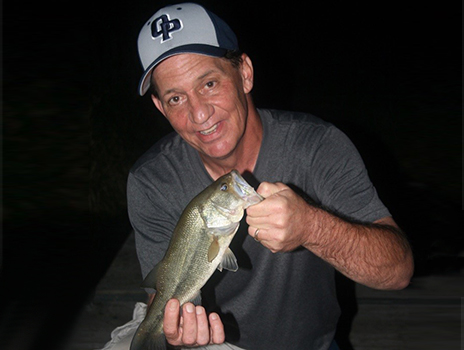- Home
- News Room
- Patient Stories Search Page
- CAR T-Cell Therapy Gives Hope to Non-Hodgkin Lymphoma Patient
August 13, 2019
Brad and Janet Zackert celebrated their 25th wedding anniversary with the best gift they could receive: Brad’s complete remission from cancer. It was possible thanks to a groundbreaking and newly FDA-approved treatment he was among the first in the region to receive.
Cancer had been a part of the couple’s life for a decade. Brad was diagnosed with non-Hodgkin lymphoma in 2008. Chemotherapy enabled a 7-year remission, but the cancer returned. Brad was transferred to The University of Kansas Cancer Center, a National Cancer Institute-designated cancer center and home of the region’s leading blood and marrow transplant and cellular therapy program. There, Brad received a stem cell transplant, but, unfortunately, that treatment wasn’t long-lasting either.
“On what would have been the 2-year anniversary of my latest remission, my PET scan showed the cancer was back,” Brad says. “I thought I’d had it licked again, that I was set for another 20 years.”
Innovative CAR T-cell therapy
The Zackerts explored Brad’s options with his care team. Doctors suggested Brad was an ideal candidate for a promising innovation, a revolutionary new treatment called CAR T-cell therapy.
“I was a little leery at first, because the treatment had just been approved,” Brad recalls. “There could be side effects. I was a little unsure, but then thought to myself, ‘the bottom line is, if I don’t do this, what am I going to do?’”
Brad’s doctors explained the process of CAR T-cell therapy, one of the most dramatic advancements in cancer medicine in decades. T cells – integral to the proper function of the immune system – are extracted from the patient’s blood. They are genetically reengineered to recognize and attack cancer cells and are then reinfused into the patient, supercharged to seek and destroy cancer.
“This is an extraordinary development, a therapy that is truly personalized, precision medicine,” says Joseph McGuirk, DO, division director of blood and marrow transplant and hematologic malignancies. “We are seeing some truly stunning results.”
New hope after treatment
Brad and Janet decided to try it. They visited the cancer center, where Brad’s blood was drawn and the T cells extracted. Dr. McGuirk approved the couple’s request to take a short Colorado vacation while the cells were reengineered. Then, it was back to the hospital to receive the new cells and hope for success.
“We went full speed ahead,” Brad says. “And thank goodness we did. I checked into the hospital on June 8 to receive my CAR T cells. Just 30 days later, my PET scan showed a complete remission. My wife and I are so happy. Here I am!”
Inside Brad’s body, the millions of newly infused CAR T cells zeroed in on cancer cells. One CAR T cell, Dr. McGuirk explains, has the ability to attack and kill many thousands of cancer cells. Each reengineered cell sweeps through the body, attaches to a cancer cell and punches a hole in that cell. The CAR T cell then releases a molecule called a granzyme through the hole. The granzyme chops up the DNA inside the cancer cell, destroying it. The CAR T cell then breaks loose and moves on to the next cancer cell.
“It took conversation with my wife, my kids and my doctors to try CAR T, and I’m so glad we decided to go forward and give it a chance,” Brad says. “It worked. I’ve always been very positive and I knew I was never going to give up, so it seemed like the right choice.”
Remission from non-Hodgkin Lymphoma
The couple celebrated 25 years of marriage this year, toasting Brad’s good health.
“To get the news that he was in complete remission was the best gift I could get,” Janet says. “When you get the news, it takes time to sink in. You’re playing out in your mind all the things that could happen. And then to find out he was in complete remission and 1 of the first CAR T-cell patients to be in complete remission so quickly – we were absolutely thrilled.”
Brad praises his care team for its expertise and support.
“I want to thank the doctors, nurses and staff,” he says. “Everyone has been amazing. They make everything so much easier.”
“We have been greatly blessed with the care this team provides,” says Janet. “Dr. McGuirk, BMT nurses Caroline Strohm and Crissy Morrison, and the Unit 41 nurses who provide an incredible level of inpatient care – these are the best of the best. You’re not going to get better care anywhere else.”
Brad is building up his strength and looking forward to getting back to all the things he loves: fishing, sports and travel. Janet, among many other things, is excited he’ll be able to enjoy their son’s recent engagement and future wedding celebration. But first, Brad will take part in Crucial Catch events with the Kansas City Chiefs. The campaign promotes cancer awareness and stresses the importance of risk reduction and early detection. Brad will proudly stand among a group of inspiring survivors of several cancer types.
“I’m so thankful for The University of Kansas Cancer Center and CAR T-cell therapy,” Brad says. “I’ve got another chance at life.”
As with all treatments, individual patient results vary. It is important to discuss your treatment options with your healthcare provider.
